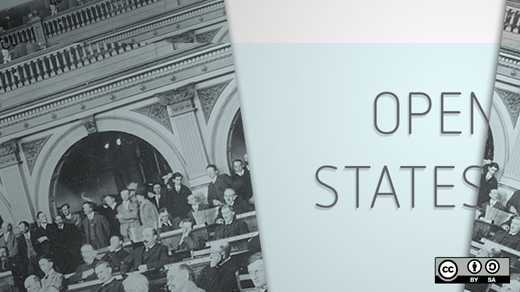We announced earlier this month that Open States—a project covered on Opensource.com in 2011—is now being maintained by the original creators of the project, a community of Sunlight Foundation alumni and other volunteers.
Open States is an effort to collect, and to some extent, standardize legislative information from all 50 states. In practical terms, what this means is that we have a huge set of web scrapers that extract details on bills, votes, legislators, and committees.
After a year of scant staffing culminating in the closure of Sunlight Labs, we expect that getting Open States fully operational again will take a significant effort, and we know from experience that maintaining the menagerie of scrapers into the future isn't easy either. (That's why we're looking for volunteers and donations.)
So why, despite the challenges, are we taking on this project? Why do we think that Open States matters so much? And where do we plan on taking this tool going forward?
Open States so far
Over seven years ago, Sunlight Labs announced The Fifty State Project, an effort to provide the public with information on America's state legislatures.
The goal was ambitious: to replicate the federal data services provided by sites like GovTrack, but across every state legislature in the country. Over time, the Fifty State Project became Open States. We ended up aggregating and structuring data every day on over 7,000 legislators and the tens of thousands of bills that they brought to the floor each year. It was only with the full support of the Sunlight Foundation, its funders, and code contributions from dozens of friends in the civic tech community that we were able to accomplish this.
Over those years, the project grew beyond anything we could've imagined. A few highlights include:
- More than 75 contributors stepped forward to help us make the project what it is today.
- In 2013 we launched our full website, a place for people to identify their legislators and track the bills that touched their everyday lives.
- The Open States API grew to be Sunlight's most popular data resource, with tens of millions of requests each year.
The project also inspired several other amazing civic tech efforts such as OpenElections, which through community contributions have achieved otherwise-impossible goals.
However, our proudest enablings of civic tech have come when others have built upon Open States data, contextualizing and analyzing it in new ways. For example, the MinnPost used Open States as the basis for its Legislature Tracker, leveraging our data so that newsrooms could generate custom bill trackers. This went on to be used by journalists across five states. Additionally, a team at UChicago's Data Science for Social Good program used Open States' full-text legislation data to build the Legislative Influence Detector, which exposes where language from lobbying organizations has found its way into actual state legislation.
Tools like these embody the potential of Open States. While some for-pay services can provide similar data, they are expensive and geared toward point-and-click web use. Open States is unique in that it provides open data, freely available code, and is extensible by anyone.
Open States has always been a data-first project. All Open States data is available via the API and bulk downloads, so that researchers, journalists, and activists can build on the platform. And OpenStates.org is the icing on the cake, opening up this database to casual or non-technical users.
The future of Open States
We have immediate plans to repair and rebuild Open States over the coming months, as outlined in our previous blog post. But we're not only taking on Open States because we want to keep serving the same reliable data that users have appreciated for years, but also because there is a lot more we'd like to do with Open States in the future.
We are going to double down on making the dataset as accessible and useful as possible, focusing first on introducing a new, more powerful API based on the Open Civic Data system. And looking forward, we have plans for further collaboration with journalists, academics, and others, to improve access to legislative data for everyone.
We'd love to hear from you if you're interested in using state legislative data in new and interesting ways. If you're considering a new project using Open States or want to make us aware of your current project, please get in touch!
And of course, please consider signing up as a potential volunteer or making a small donation. Thank you for your support as we take Open States into the future!
Reposted with permission from the Open States blog.







Comments are closed.